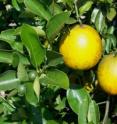Winter drought stress can delay flowering, prevent fruit loss in orange crops
Successful mechanical harvesting of perennial fruit crops requires efficient, economical harvesting systems that do not reduce trees' production life or diminish fruit quality. Most of the world's citrus is now harvested manually, but the use of efficient and lower-cost mechanical harvesting techniques is expected to increase in the next few years, especially in the large citrus plantations in Florida and Brazil. The citrus industry is ramping up efforts to extend the harvest season past June, when the following year's crop becomes large enough to be susceptible to mechanical harvesting; discovering techniques that improve late-season harvesting will give growers better tools to minimize damaging impacts on the next year's fruit yield. Researchers from the University of Florida's Citrus Research and Education Center published a study in a recent issue of HortScience that determined if winter drought stress could successfully delay flowering and fruit development of immature 'Valencia' sweet oranges to avoid young fruit loss during late-season mechanical harvesting.
The researchers hypothesized that if the Florida 'Valencia' bloom period could be delayed by a few weeks using winter drought stress—without negative effects on the quality of the current season's crop—the "fruitlets" from delayed flowering would be too small to be affected by mechanical harvesting late in the current harvest season, thus safely extending the mechanical harvesting period.
The study was designed by Juan Carlos Melgar, Jill M. Dunlop, L. Gene Albrigo, and James P. Syvertsen and conducted at the Citrus Research and Education Center in Lake Alfred. Beginning in December 2006 and continuing for three consecutive seasons, Tyvek® water-resistive barrier material was used as a rain shield groundcover under 13-year-old-trees. The researchers applied three treatments: drought (no irrigation and covered soil), rain only (no irrigation, no cover), and normal irrigation (rain and no cover). Covers were removed in February or March and normal irrigation and fertilization were resumed.
The drought stress did not affect fruit yield, size, percentage juice, or juice quality of the current crop harvested in May and June relative to continuously irrigated trees. Drought stress delayed flowering by 2 to 4 weeks so that the immature fruit for next season's crop were smaller than on continuously irrigated trees during June, but fruit growth caught up by September. During mechanical harvesting, previously drought-stressed trees lost fewer young fruit than continuously irrigated trees.
"The results showed that winter drought stress effectively delayed flowering and avoided young fruit loss during late-season mechanical harvesting without negative impacts on yield or fruit quality", Melgar noted.
The researchers observed that rain-excluding covers were used as an experimental tool, but that the covers may not be a viable commercial option for growers. They added that natural cover crops may help in inducing drought stress, but are yet to be tested as a management tool.
Source: American Society for Horticultural Science
Other sources
- Winter drought stress can delay flowering, prevent fruit loss in orange cropsfrom PhysorgMon, 20 Sep 2010, 21:35:16 UTC
- Winter drought stress can delay flowering, prevent fruit loss in orange cropsfrom Science BlogMon, 20 Sep 2010, 20:14:32 UTC
- Winter drought stress can delay flowering, prevent fruit loss in orange cropsfrom Science BlogMon, 20 Sep 2010, 20:14:31 UTC
